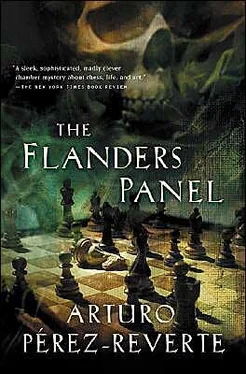“I wanted to warn you,” he said.
“Warn me?”
“She was already dead, Julia,” he said in a low voice. “I didn’t do it. When I got to your apartment, she was already dead.”
“How did you get in? Did she open the door?”
“I’ve told you; she was already dead… the second time.”
“The second time? You mean there was a first?”
Max leaned his elbows on the table, resting his unshaven chin on his thumbs, and let the ash fall from his cigarette.
“Hang on,” he said with infinite weariness. “It’s best if I start at the beginning.” He raised the cigarette to his lips again, half-closing his eyes against the smoke. “You know how badly Menchu took that business with Montegrifo. She was pacing round her house like a caged animal, muttering all kinds of insults and threats. ”They’ve robbed me!“ she kept shouting. I managed to calm her down, and we talked it over. The idea was mine.”
“What idea?”
“I have contacts with people who can get almost anything out of the country. I suggested that we steal the Van Huys. At first she went crazy, hurling abuse at me and talking about your friendship. Then she saw that it wouldn’t actually hurt you. Your responsibility was covered by the insurance, and as for your share of the profits… well, we’d find a way of compensating you later on.”
“I always knew you were a son of a bitch, Max.”
“Maybe I am, but that’s beside the point. The important thing is that Menchu agreed to my plan. She had to get you to take her home with you. Drunk or high on drugs… To be honest, I never thought she’d do it as well as she did. The next morning, I was to phone and see if everything was ready. So that’s what I did, and I went over there. We wrapped up the painting to camouflage it and I took the keys Menchu gave me. I was to park the car in the street and come up again to pick up the Van Huys. The plan was that after I left with the painting, Menchu would stay behind to start the fire.”
“What fire?”
“In your apartment.” Max laughed mirthlessly. “That was part of the plan. I’m sorry.”
“You’re sorry!” Julia thumped the table in stunned indignation. “Good God, you have the nerve to tell me you’re sorry!” She looked at the walls and then at Max. “You must both have been completely mad to think up something like that.”
“We were perfectly sane, actually, and nothing would have gone wrong. Menchu would have faked some kind of accident, a discarded cigarette, for example. And with the amount of solvents and paint in your apartment… We’d decided that she should stay there until the last minute and then leave, choking on the smoke, hysterical and calling for help. Before the firemen managed to get there, half the building would be in flames.” He made a face of crude apology and regret. “Everyone would assume that the Van Huys had gone up in flames along with everything else. You can imagine the rest. I’d sell the painting in Portugal to a private collector we were already negotiating with… In fact, the day we met in the Rastro, Menchu and I had just seen the middleman. As for the fire, Menchu would have accepted responsibility; but since she was your friend and it was an accident, the charges wouldn’t have been that serious. A charge brought by the owners, perhaps, but nothing more. What delighted her most, she said, was the thought of Montegrifo’s face when he found out.”
Julia, incredulous, shook her head.
“Menchu wasn’t capable of doing something like that.”
“Menchu, like all of us, was capable of anything.”
“God, you’re a bastard, Max.”
“At this stage, what I am isn’t terribly important.” Max’s face took on a look of defeat. “What does matter is that it took me quite a while to bring the car round and park it in your street. The fog was really thick and I couldn’t find a parking place. That’s why I kept looking at my watch; I was worried you might turn up any minute. It must have been about quarter past twelve when I went upstairs again. I didn’t ring. I opened the door with the key. Menchu was in the hall, lying on her back, with her eyes wide open. At first I thought she must have fainted out of sheer nervousness, but when I knelt down by her side I saw the bruise on her throat. She was dead, Julia, and she was still warm. I panicked. I knew that if I called the police, I’d have a hell of a lot of explaining to do. So I threw the keys on the floor, closed the door and went racing down the stairs. I couldn’t think. I spent the night in a pension, absolutely terrified. I didn’t sleep a wink. Then in the morning, at the airport… Well, you know the rest of the story.”
“Was the painting still in the house when you found Menchu dead?”
“Yes. That was the only thing I noticed apart from her. It was on the sofa, wrapped up in newspaper and tape, just as I’d left it.” He gave a bitter laugh. “But I didn’t have the guts to take it with me. I was in enough trouble already.”
“You say Menchu was in the hall? Yet she was found in the bedroom. Did you see the scarf round her neck?”
“There was no scarf. She had nothing round her neck, and her neck was broken. She’d been killed by a blow to the throat.”
“And the bottle?”
“Don’t you start on about that bloody bottle. All the police keep asking me is why I stuck that bottle up Menchu’s cunt. I swear I don’t know what they’re talking about.” He put what remained of his cigarette to his lips and inhaled deeply, nervously, giving Julia a suspicious look. “Menchu was dead, that’s all. Killed by a single blow and nothing else. I didn’t move her. I was only there for about a minute. Someone else must have done that afterwards.”
“Afterwards? When? According to you, the murderer had already left.”
Max frowned, trying to remember.
“I don’t know.” He seemed genuinely confused. “Perhaps he came back later, after I left.” Then he turned pale as if he’d just realised something. “Or perhaps…” Julia saw that his cuffed hands were trembling. “Perhaps he was still there, hidden. Waiting for you.”
They’d decided to share the work. While Julia visited Max and subsequently recounted the story to the Inspector, who listened to her without even trying to disguise his scepticism, Cesar and Munoz made enquiries amongst the neighbours. The three of them met in an old cafe in Calle del Prado in the evening. Max’s story was scrutinised from all angles during a prolonged discussion round the marble table, the ashtray overflowing and the table crowded with empty cups. They leaned towards each other, like conspirators, talking in low voices.
“I believe Max,” concluded Cesar. “What he says makes sense. After all, the story about stealing the painting is just the sort of thing he’d do. And I can’t believe he was capable of doing the rest… The bottle of gin was too much, my dears. Even for a man like him. On the other hand, we know that the woman in the raincoat was also around. Lola Belmonte, Nemesis or whoever she turns out to be.”
“Why not Beatrice of Ostenburg?” asked Julia.
Cesar looked at her reprovingly.
“I find that kind of joke completely uncalled for.” He shifted nervously in his seat, looked at Munoz, whose face was a blank, and then, half-joking, half-serious, held up his hands, as if warding off ghosts. “The woman who was prowling round your building was flesh and blood. At least I hope she was.”
He had discreetly interrogated the porter in the building opposite, whom he knew by sight. From him, Cesar had found out a few useful facts. For example, around twelve, just when he was finishing sweeping the hallway, the porter had seen a tall young man, his hair in a ponytail, come out of the front door of Julia’s building and walk up the street to a car parked by the kerb. Shortly afterwards – and Cesar’s voice grew hoarse with sheer excitement, as it did when he was recounting some high-class bit of social tittle-tattle – perhaps half an hour later, when the porter was taking in the rubbish bin, he’d passed a blonde woman wearing dark glasses and a raincoat. Cesar lowered his voice as he said this, looking around apprehensively, as if the woman might be sitting at one of the nearby tables. The porter, it seems, didn’t get a good look at her because she was walking up the street, in the same direction as the young man. Nor could he say with certainty that the woman had come out of Julia’s front door. He’d simply turned round with the rubbish bin in his hand and there she was. No, he hadn’t told the policemen who questioned him that morning because they hadn’t asked him about that. He wouldn’t have thought of it, the porter confessed, scratching his head, if Don Cesar hadn’t asked him. No, he didn’t notice if she was carrying a large package. He’d just seen a blonde woman walking along the street. And that was that.
Читать дальше












